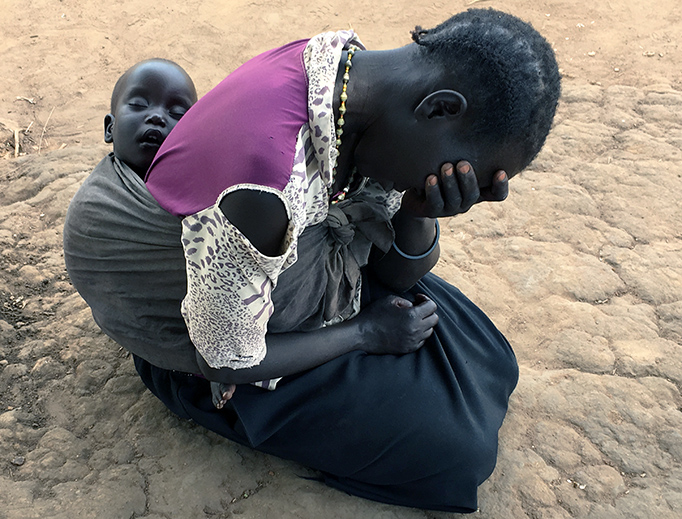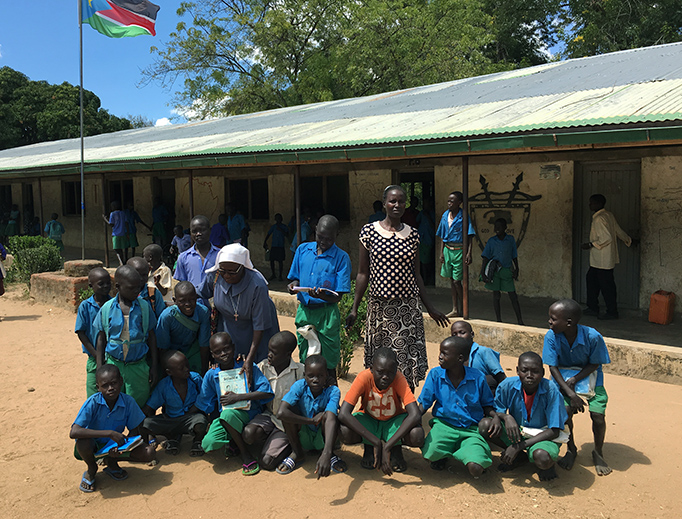Fr. John Barth, Maryknoller Missionary in Africa
The Good News is shared with people who need some good news in their lives for a change.

Fr. John Barth is a Maryknoll missioner who serves at St. Mary’s Mission Parish in Kitgum, Uganda. The parish is located near the border with South Sudan, where he frequently travels to minister. He recently shared about his missionary work.
How did you become a Maryknoll missioner and come to work in Africa?
In 1982, at the age of 30, I volunteered to work on the Mexico/California border with an organization called Los Niños. Living on the border of two starkly different countries nagged at me: “Why so close yet so far apart?” I asked myself. The inequity of it all unsettled me. The world was opening up to me and I was all eyes and all questions.
Then I was struck by the powerful words of Jesus in the Last Judgment scene (Matthew 25:31-46) where he talks about giving water to the thirsty, food to the hungry, clothes to the naked, visiting those in confinement and so on. It occurred to me that is exactly what I was now doing with my co-volunteers each week as we commuted to work across the border into Baja California Norte.
After two years at the border, I was enjoying dinner with the chaperones of a group of high school students who were visiting our border ministry for an exposure trip. They asked me what I intended to do when my two years were up at the border. I told them I was thinking about entering the seminary and becoming a priest. I was convinced that the world and all its problems were not going to end just by government action or volunteer work by well-intentioned people. The world needed to be saved from itself. The world needs a Savior, and since we already had one, I wanted to go to work for Him.
The chaperones introduced me to their son, Fr. Jack, who was a Maryknoll Missioner in Los Angeles. I haven't looked back since.
After my ordination in 1991, I worked 11 years with the blind in Cambodia, with HIV/AIDS patients and on the Maryknoll Leadership team. I was then sent to South Sudan. With the help of the Christian Blind Mission, I helped set up the country's only eye hospital in the capital Juba.
And how did you come to Uganda?
Once the eye clinic had been established, I was sent to a large rural parish in the mountains. There was no lack of things to repair there, or at the other parishes in the diocese. I worked with a younger, tireless pastor, fixing dorms, the hospital, parish residence and the water and solar systems. The parish cars were always breaking down as well, due to the harsh roads in the mountainous wilderness.
All of our supplies came from northern Uganda, a four hour drive south. Since I didn’t have a cell phone or internet connection, I relocated to Kitgum, Uganda. I could still serve the parish in South Sudan, as well as refugees who populated 15 settlement camps in northern Uganda. Working in Kitgum I’ve been able to organize shipments of food and supplies into South Sudan, which have helped keep open three Catholic schools.
Life is difficult in South Sudan, as one in four have had to leave home in order to survive. There are more than one million living in settlement camps in northern Uganda.
How is the political situation in South Sudan?
Greed wrapped in a shroud of tribal competition results in a political stalemate with no signs of solution. Inflation runs very high, the government is broke, foreign economic sanctions have helped cripple the economy. Government salaries have not been paid in many months. Fuel has to be found on the black market, businesses struggle or close. People have given up and migrated for safety and food.
Today, there remains fighting on a small scale in pockets around the country. The country is awash with arms in the hands of hungry soldiers and opposition fighters. Travel by road is out of the question for most of the country where bandits interrupt what is left of any commerce. The region has experienced three civil wars in the past three decades, including two fighting for independence from the Muslim/Arab north. Once long sought independence was achieved in 2011, the young country was born only to fall into a new civil war, with two Christian tribes, the Dinka and Nuer, fighting for dominance.
In the section of South Sudan where I travel, the road is quite remote with hardly any population. There has been little or no fighting as in other villages in other parts of the diocese where villagers ran for their lives when attacked by the army last year. The army remains encamped there making it unsafe to return. People in the refugee settlement camps along the border are there for food security and for their own safety. For the older ones, this is their third stint living in a refugee camp in Uganda. It's becoming a way of life.
The violence I observe is limited to tit-for-tat violence over cattle, debts or land. If you walk through the men’s ward at the mission hospital you are likely to find one or two people with gunshot wounds due to drunken fights that lead to settling scores with guns rather than words. Poverty is driving many into a culture of violence.
What good have you seen through your work?
The blind see again, hungry people are fed, sick people get help with medical bills, school fees are paid keeping scores of students studying. The Good News is shared with people who need some good news in their lives for a change.
What needs to you have?
The old church I visit in South Sudan needs serious repairs. The parish vehicles regularly break down and need spare parts from dealers in Kampala, 400 miles to the south. There are many children in the refugee camps, but not enough schools to serve them.
To find out how you can help the Maryknoll Fathers and Brothers, visit https://maryknollsociety.org/.














